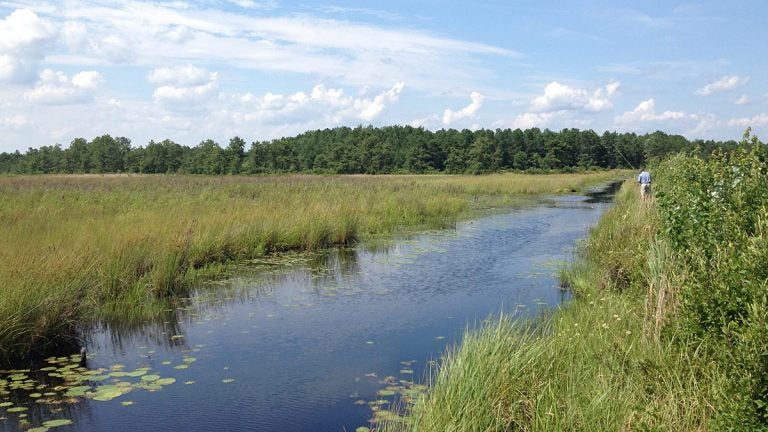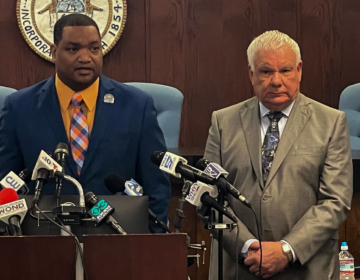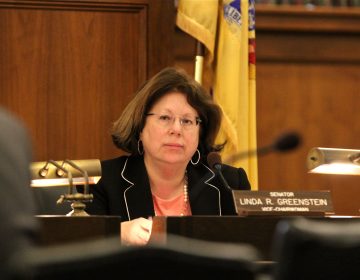Who should have the final say on the Pinelands pipeline?

Parker Preserve area in the Pinelands. (Photo courtesy of Pinelands Preservation Alliance)
The New Jersey legislature created the Pinelands Commission to protect the Pinelands National Reserve by regulating development in some parts of the environmentally sensitive area, and prohibiting it altogether in others.
South Jersey Gas has recently gone to state court, looking to reverse the Commission’s decision to reject a proposed company pipeline in protected areas.Executive director Carleton Montgomery of the Pinelands Preservation Alliance, a not-for-profit environmental group, said the implications of the dispute go far beyond whether the pipeline gets built.
South Jersey Gas lawyers argue that a decade-old Pinelands Commission decision allowing development in protected areas set a precedent, giving the Commission no authority to reject the pipeline.
If that argument flies in court, Montgomery fears it will have the effect of rendering all future Commission decisions unenforceable, leaving the Reserve more vulnerable to development than it’s been since federal statute created its protected status in 1978.
“It would certainly put some kind of weird limit on the ability of today’s Pinelands Commission,” Montgomery said. “It would mean every time the Pinelands Commission blinks and does something bad, that could be binding on the Commission for the future.”
Making Montgomery and other pipeline opponents still more nervous is their belief that Gov. Christie is enacting some behind-the-scenes political moves to help the project along.
The pipeline has many supporters in addition to Christie. One of them is Dr. Edward Salmon, a former state legislator and former president of the New Jersey Board of Public Utilities who is chairman and co-founder of the New Jersey Energy Coalition.
Salmon argues that the 22-mile pipeline will not only fulfill the state’s energy needs, but also help the environment by significantly lowering carbon dioxide emissions because it will replace the coal in Cape May County’s B.L. England generating plant with natural gas.
Another advantage to the pipeline, Salmon said, is that it would encourage more use of sustainable energy sources such as wind and solar power by building up a strong baseload to supply power through the times when it’s not sunny or windy outside.
“It’s a great project,” Salmon said. “To me, it’s a no-brainer.”
In January, the Pinelands Commission voted on the proposed pipeline, and tied 7-7. The project, which needed eight votes for approval, was apparently defeated.But South Jersey Gas has since taken its case to state appellate court, petitioning for an order to require the Pinelands Commission to approve the proposal.
In the meantime, Christie has nominated two new members for the Pinelands Commission to replace commissioners who voted against the pipeline, in what environmental activists allege is an attempt to pack the body with project supporters.
Montgomery said that even if the appellate court rules against South Jersey Gas, the company could still come back with a revised plan if Christie successfully gets pipeline supporters on the Pinelands Commission. A Christie spokesman didn’t respond to a request for comment.
“It’s bad government of the worst kind,” Montgomery said. “Because this company is disappointed, it’s going to go back and shape the commission to its purposes.”
A South Jersey Gas spokeswoman said she was unable to comment on the ongoing case.
But Salmon argues that what’s going on right now is simply the way the system works. Individuals or groups go to court all the time to contest decisions by administrative bodies. That’s their right.
Sometimes the system goes your way. Sometimes it doesn’t. And pipeline supporters are working within the parameters of the law to see that things go their way, the same way any group trying to accomplish an objective would. “To me, the end decision has to be based on facts, not emotion,” Salmon said.
Among the many state residents waiting for an outcome in the case is former New Jersey Gov. James Florio. As a member of Congress back in 1978, he authored and eventually achieved passage of a federal statute creating the 1.1-million-acre Pinelands National Reserve. He and the other lawmakers who supported it were worried about the many developers who wanted to build in the area.
A major concern then, and now, is that the state’s largest aquifer located under the Pine Barrens is a major source of New Jersey’s drinking water. Florio said lawmakers in the 1970s were worried about the aquifer’s contamination, and he still worries that might be a danger if the pipeline goes in and springs a leak.”I’m concerned about the integrity of the pinelands,” Florio said.
WHYY is your source for fact-based, in-depth journalism and information. As a nonprofit organization, we rely on financial support from readers like you. Please give today.




